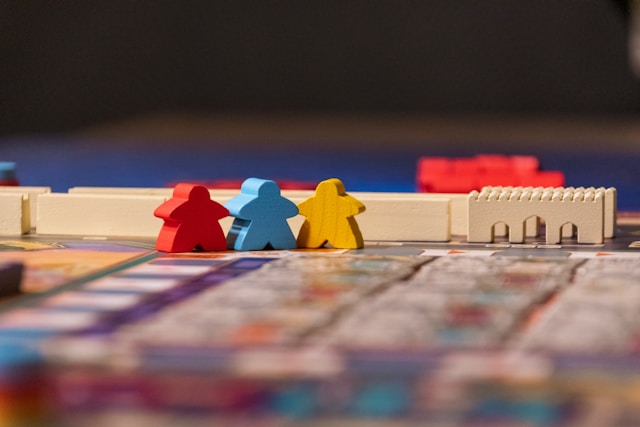For little ones, play is far more than simple entertainment — it’s their way of discovering the world, practising new abilities, and building self-assurance. Many educational games for toddlers combine bright visuals, clear steps, and playful sounds, and platforms show how safe, age-appropriate design can turn screen time into real learning.
Parents can make the most of these games by:
- Selecting options designed for their child’s age, with vivid imagery and easy-to-follow guidance.
- Keeping sessions short to match a toddler’s attention span.
- Playing together to encourage conversation and connection.
- Linking digital activities to real-life experiences, like finding shapes around the home.
By introducing these playful tools early, you help toddlers see learning as an adventure, not a chore.
From numbers to confidence: math the fun way
Once children begin recognizing shapes and patterns, they’re ready to take their first steps into the world of numbers. With interactive math learning games for kids , children learn to identify and count numbers, practise counting forward and backward, compare quantities (more/less/equal), apply maths to everyday moments like shopping or cooking, and build logical reasoning through playful problem-solving.
These activities are designed to make math concepts intuitive and enjoyable, so children feel encouraged to explore further.
Key learning results include:
- Developing foundational math skills by identifying and counting numbers.
- Mastering counting forward and backward with interactive games.
- Comparing quantities to find more, less, or equal values.
- Applying math concepts to real-world situations like shopping or cooking.
- Boosting logical reasoning through playful problem-solving.
Imagine your child helping “shop” for three apples in a game, then later proudly counting out the same number from the fruit bowl at home. This link between virtual play and real life makes learning stick.
Beyond simple counting, maths games also train children to notice patterns, follow sequences, and think critically about problems. For example, when a child compares “more” and “less,” they are also learning to make decisions — skills that transfer to everyday choices like sharing toys or dividing snacks with friends. Some games even introduce basic geometry or simple puzzles, encouraging kids to recognise shapes and understand how pieces fit together.
Making the most of learning games
To build lasting skills, variety matters. Pair digital learning with offline activities to reinforce new concepts:
- After a counting game, count toys together while tidying up.
- Use building blocks to compare “more” and “less.”
- Create simple cooking moments, like measuring cups of flour, to practice quantities.
- Turn shopping into a maths adventure by asking your child to find two apples or count how many bananas are in the bunch.
- Create number lines or outline shapes with sidewalk chalk outdoors, blending active play with educational practice.
These everyday activities extend what toddlers learn on screen into the real world, helping them connect abstract concepts to tangible experiences. This not only strengthens number sense and logical thinking but also nurtures curiosity, communication skills, and the ability to solve problems creatively. With the right mix of digital and hands-on play, children gain confidence and see learning as a natural, fun part of life.
Creating a daily learning routine that works
The benefits of educational games grow when they become part of a child’s regular day — without overwhelming them. You don’t need long, structured sessions. Instead, weave short bursts of play into natural pauses: a few minutes after breakfast, during a car ride, or before bedtime.
Tips for building a smooth routine
Here are a few simple ways to keep daily learning playful and stress-free:
- Rotate different types of games during the week — one day focused on numbers, another on shapes, another on creative drawing.
- Use familiar objects from home in follow-up activities to reinforce game content.
- Involve siblings or friends to add a social element and encourage cooperative problem-solving.
- Keep track of progress with a simple chart or sticker system, letting your child celebrate each new skill.
These small adjustments help parents stay consistent without overwhelming the child, turning everyday play into a natural part of their growth.
Why routine builds confidence
Another benefit of a daily learning routine is the sense of security it gives toddlers. Children thrive when they know what to expect, and short learning sessions at predictable times can become something they look forward to.
Parents don’t need to be experts — just showing genuine interest and celebrating small successes makes a big difference. Even clapping for a correctly counted set of blocks or a neatly traced number reinforces the idea that learning is exciting and worthwhile.
Turning moments into milestones
When learning fits naturally into a child’s everyday life, it stops feeling like “extra work” and becomes something they look forward to. With just a few minutes of focused, engaging play each day, you can help your toddler steadily build skills, confidence, and a love for discovery — one fun moment at a time. And as their abilities grow, so will the opportunities to explore more advanced games, try new challenges, and share their achievements with pride.
In the end, every smile during play, every “look what I did!” moment, and every new skill is a reminder that learning isn’t about pressure — it’s about joy. Give your child these small opportunities each day, and you’ll see curiosity turn into confidence, one playful step at a time.








